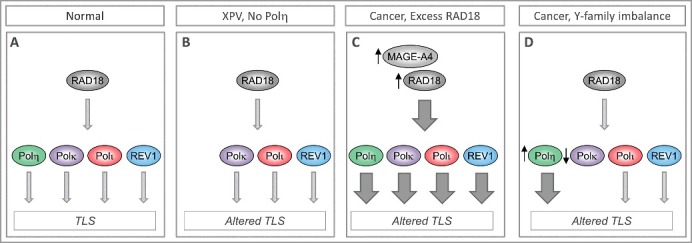Figure 1.

Imbalanced expression/ activity of RAD18 and Y-family DNA polymerases dictates choice of TLS polymerases and can influence replication fidelity and genome stability. (A) In normal cells TLS polymerases are activated sparingly and used selectively to minimize error-prone DNA synthesis and ensure genome stability. (B) In XPV cells lacking functional Polh, compensatory bypass of Polh-cognate lesions by inappropriate DNA polymerases leads to mutagenesis. (C) In many cancer cells RAD18 is expressed at high levels (sometimes owing to stabilization by its binding partner MAGE-A4), leading to increased TLS pathway activation. It is not known whether all Y-family DNA polymerases are equally dependent on RAD18 for activation. Differential activation of Y-family TLS polymerases by over-active RAD18 would constitute a mechanism of imbalance and altered TLS. (D) Over-expression or reduced expression of individual TLS polymerases has been reported in many cancers and represents another mechanism of TLS pathway imbalance and mutagenesis.
